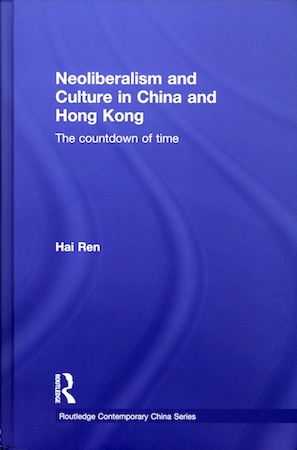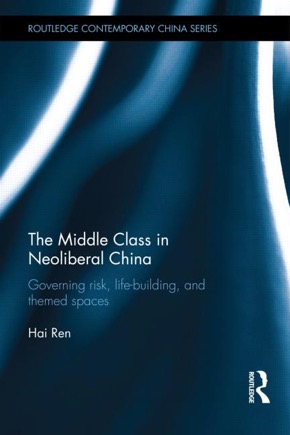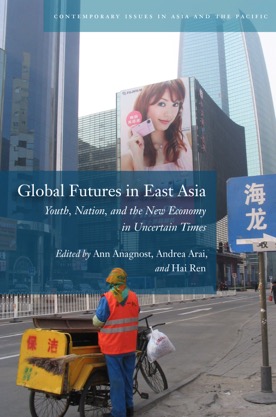Hai Ren
As a scholar, one major goal is to produce high quality scholarly work, both theoretically and empirically. I received my Ph. D. in sociocultural anthropology, but I was broadly trained to appreciate and accept exciting opportunities offered by interdisciplinary work (not only anthropology and Asian studies, but also other disciplines such as literature, history, ethnic studies, women’s studies, and sociology). In the first few years after graduate education, while working as an assistant professor at the Department of Popular Culture at Bowling Green State University in Ohio, I intentionally expanded my knowledge to include philosophy, media studies, and American studies. Thus, my current theoretical work is broadly interdisciplinary and engages with two areas of scholarship that is related to the sociocultural effects of globalization on experiences of everyday life: (1) the literature on culture industries (including new media/technologies, capital accumulation, work/labor organization, and the politics of regulating and regularizing life); and (2) that on Asian/Chinese societies and popular culture formations. My publication record clearly shows this.
My first book, entitled Neoliberalism and Culture in China and Hong Kong: The Countdown of Time (Routledge, 2010), examines the historical transformation of China from a socialist country to a neoliberal state during the process of its reunification with Hong Kong from the late 1970s to the late 1990s. Among a whole spectrum of changes ranging from sovereignty and government to everyday experiences, the most important has been the reconstitution of the Chinese nation-state, not only through the Chinese government’s resumption of sovereignty over Hong Kong, a territory lost in the nineteenth century, but also through a remaking of socialist (mainland) China to be synchronic with the contemporary capitalist world. Synchronization is the term the Chinese use to describe an ongoing process of making that country’s economic system more compatible with global capitalist practices while maintaining a socialist government.

This book significantly reframes the scholarly debate over neoliberalism. Instead of treating neoliberal globalization as a homogenizing process of Westernization spreading relentlessly across the world since the 1970s, I discuss globalization as a general process that interfaces with a variety of governmental organizations and institutions, communities, and individuals. More specifically, I argue that the emergence of neoliberalism as a dominant trend in the late twentieth century is closely tied to the systemic social, political, and cultural changes in this period. The international rise of neoliberalism was inseparable not only from internal conflicts between neoliberals and Keynesians within capitalist welfare states such as Britain and the United States, but also from external battles between capitalist and communist countries during the cold war. In the Chinese context, as this book shows, neoliberalism is inseparable from problems of national reunification, graduate rejection of Maoist socialist politics in the period from 1978 to 1989, and changes to the constitutions of the Chinese Communist Party and of China.
I argue that unification with Hong Kong created a critical historical condition that enabled China to become a neoliberal state. Previous scholars have typically examined China’s neoliberal process in terms of specific aspects of neoliberal practices and their consequences. What this book offers is a critical understanding of the dominant role Hong Kong’s return played in China’s neoliberalization, as shown by radical reconfigurations of the mainland’s sovereignty, government, and everyday life. The successful negotiation of the 1984 Sino-British Joint Declaration that set in motion Hong Kong’s return entailed a change of national sovereignty. This international agreement also dovetailed with the government’s political decision in the period from 1978 to 1989 to completely reject Maoist socialism that attempted to realize the dream of communism. The Hong Kong countdown clock, erected in Tiananmen Square in 1994, synchronized these concrete political and social transformations by orchestrating a shift in the national mindset from feelings of national humiliation (deriving from China’s first engagement with the capitalist world in the nineteenth century, which resulted in its loss of the Hong Kong and Macao territories) to pride in China’s national revival and success (arising from its contemporary globalization experience). The problem of rewriting history was addressed through spectacle, media, and the transformation of cultural organizations into cultural enterprises. Eventually, the co-presence of Hong Kong and (mainland) China became equated with the coexistence of capitalism and socialism. In discussing these changes, my analysis of China’s neoliberalization synthesizes the macro level of systemic and structural changes with the micro level of individual and everyday practices and experiences.
My second book, The Middle Class in Neoliberal China: Governing Risk, Life-Building, and Themed Spaces (London: Routledge, 2013), is a sequel of the first book. This book examines middle-class formation and risks in contemporary China.

After decades of reconfiguration and redirection of the Chinese economy, society, and politics toward neoliberalism since the late 1970s, China has become not merely one of the world’s fastest growing economies but also one of the most polarized states. Facing rapidly rising risks caused by this historical transformation, a new normative politics of imagining and developing a stable middle class society has been emerging in China. My investigation of this politics focuses on three major questions: How does the Chinese state address problems of national sovereignty and political representation to create the middle class both as a legitimate category of the people and as an ideal norm of citizenship? How does the recognition of the middle class norm take place in the practice of everyday life? And what kind of risks does the middle class politics consequentially generate not only for aspired middle class subjects but also for the disenfranchised? My inquiry into these questions looks at a set of practices, bodies of knowledge, measures, and institutions that aim to manage, govern, control, and orient the behaviors, gestures, and thoughts of Chinese citizens. Specifically, I use ethnographic information, historical archive, and media materials to examine the transformation of cultural institutions like museums into cultural enterprises like theme parks, the mediation of meanings of everyday life toward middle class values and conducts, and participatory consumption by both cosmopolitan and disenfranchised individuals in their life-building processes. This project contributes not only to the understanding of the development of the Chinese middle class society but also to the scholarly debate over the relationship between governmental apparatuses, subjectification, and life-extension.
I also have collaborated on editing two publications. I coedited New Media Subversion (2010), a special issue for the online journal Hyperrhize: New Media Cultures. This three-year project drew wide participation from scholars in many fields (literature, media and technology studies, American studies) and artists. As new media play an increasingly important role in daily lives across the globe, this project aims at evaluating new media’s potentials and limitations in changing cultural norms. Moreover, I also coedited the book Global Futures in East Asia: Youth, Nation, and the New Economy in Uncertain Times (Stanford University Press, 2013), a collection of ethnographic explorations of life-making in a time of great economic uncertainty and upheaval. This six-year project brings together both junior and senior scholars whose works address similar issues but focus on particular locations in East Asia (China, Japan, South Korea and Taiwan).

I am currently working on a major project entitled “The Precariat: An Intellectual History and Digitally Enhanced Learning.” Recently, scholars in many disciplines begin to argue for the emergence of the precariat, a human subject who lives precariously in the context of contemporary globalization, economic change, and social insecurity. They argue that a comprehensive understanding of this new human subject may potentially enable scholars to further explore the human condition and create links among debates that are usually conducted separately. This project addresses some basic questions: How is the figure of the precariat different historically from other similar figures (like the proletariat) who have been theorized by critical thinkers and philosophers since the late nineteenth century? How does the idea of the precariat become legible and legitimate through particular forms of narrative, narration, and media? And how is a precariat recognized in the practice of everyday life? My research team, which is composed of faculty and graduate students from the Departments of East Asian Studies and Electrical & Computer Engineering, will examine the history of the precariat as an intellectual idea, create an interactive multimedia digital application that optimizes the experience of learning/thinking about that history, and conduct fieldwork to understand the manifestation of precarity in everyday life. We hope to generate new knowledge on the precariat, and produce a model for integrating digital and design technologies into the creation of an engaged learning/thinking experience.